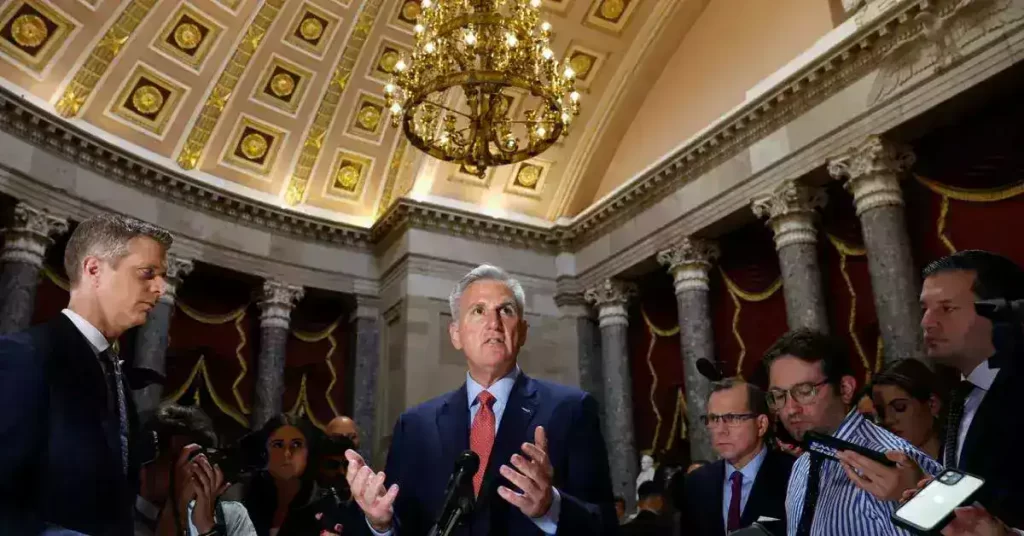Kevin McCarthy’s Ultimate Leadership Test: Navigating Grand Old Party Unity Amid Looming Government Shutdown
Ever since his determined pursuit of the House Speaker position – a journey marked by 15 consequential votes – Kevin McCarthy of California, the Republican leader, has deftly guided a razor-thin five-seat majority through intricate legislative challenges. Publicly, at least, he has managed to preserve unity within his conference, skilfully bridging the gap between staunch conservatives and more moderate members of the House GOP.
In a series of critical legislative battles, McCarthy’s leadership has been instrumental in reconciling the differences between his party’s various factions. This prowess was evident in the successful passage of key legislation, including the National Defense Authorization Act, which consolidated the priorities of hard-right conservatives and moderates alike.
McCarthy’s strategic acumen has also been demonstrated when forcing the hands of the Democratic opposition. Despite vocal calls from congressional Democrats and President Joe Biden for an unencumbered debt ceiling increase earlier in the summer, McCarthy negotiated an unexpected deal with Biden. This compromise saw the debt ceiling raised in exchange for coveted conservative spending cuts, a feat achieved even as Biden adamantly declared he would not engage in such discussions.
Following the House’s approval of the debt ceiling deal, McCarthy exultantly stated, “Keep underestimating us, and we’ll keep proving to the American public that we’re never giving up on you.”
However, McCarthy’s leadership faces its most significant test yet as legislators reconvene after the August recess. With just three weeks on the clock, Congress is tasked with passing 11 spending bills or a continuing resolution to avert a looming government shutdown. This challenge is exacerbated by the presence of a handful of ultra-conservative members within the party, who demand comprehensive spending cuts across the board. The prospects of keeping the government funded are thus shrouded in uncertainty.
McCarthy has not been oblivious to the fragility of his speakership, constantly underpinned by a faction of around 30 conservative lawmakers. This contingent, known as the ultra-conservative House Freedom Caucus, has consistently wielded its influence to obstruct vital legislative initiatives unless their demands are met. Their resistance came to a head during the debt ceiling deal negotiation, resulting in a rare procedural stall that halted legislative action, an event unseen in over two decades.
Despite the persistent challenge posed by this group, McCarthy has succeeded in shepherding crucial legislation through the House. The debt ceiling deal and the annual defense policy bill stand as testaments to his ability to navigate these political waters.
McCarthy’s leadership approach has necessitated concessions to his right-leaning members, a point of contention for more moderate GOP lawmakers. Notably, he has allowed votes on controversial amendments to the National Defense Authorization Act, a move that appeased the House Freedom Caucus but garnered dissent from more centrist colleagues.
Even as he navigates these divisions, McCarthy remains steadfast in his assertions that these concessions are part of the pragmatic path to preserving a five-seat majority. He highlighted instances like the passage of the House GOP’s border security bill in May, which came after extensive internal debates over its language and scope.
Nevertheless, McCarthy’s most immediate challenge lies in averting a government shutdown. With only 11 spending bills standing between the nation and a potential crisis, McCarthy must walk a tightrope to satisfy both his conservative base and the practical demands of governance. Matt Green, a congressional leadership scholar at Catholic University, acknowledges that appropriations bills have always presented challenges for leaders, but McCarthy’s situation is uniquely demanding. Bills passed by the Republican-controlled House are poised for an uphill battle in the Democratic-controlled Senate and White House, necessitating bipartisan compromise on spending matters.
The complexity of the situation is further exacerbated by the reluctance of hardline conservatives to engage with Democrats, as seen in the debt ceiling debate earlier in the summer. McCarthy’s ability to strike a balance between compromise and party loyalty will be put to the ultimate test.
House conservatives have already begun staking out their spending positions during the recess, typically a period when lawmakers return to their districts. Representative Chip Roy of Texas has called for defunding the Department of Justice and the Department of Homeland Security. He made it clear that without substantial changes to both departments, he would not support even a short-term continuing resolution to fund the government.
McCarthy’s ability to navigate these turbulent waters and strike a harmonious balance between the diverse factions within his party will shape not only his legacy but the trajectory of the nation’s governance. As the clock ticks down and the specter of a government shutdown looms, his leadership and negotiation skills will be more critical than ever before. The upcoming months will undoubtedly test his capacity to bridge the divide between pragmatic compromise and unwavering conservative principles, defining his place in the annals of political leadership.



